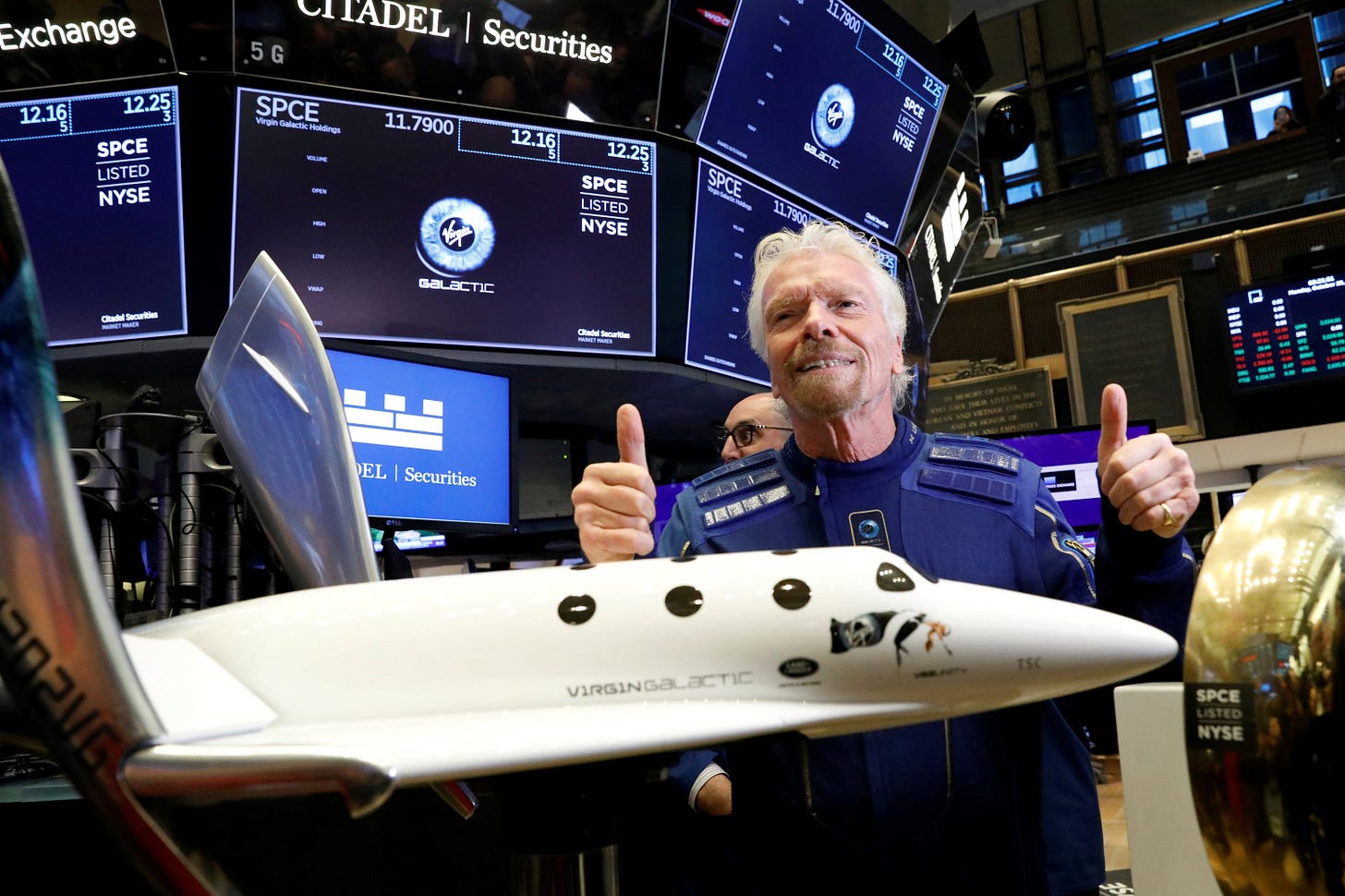Beyond Billionaire Success: Richard Branson’s ADHD and the Realities of Inspirational Reporting
Success Stories are a good read, but how helpful are they for people with ADHD?
🚨 Sound the alarm!! *Opinion Piece* - I want to hear your thoughts on this!
Hello reader! I am trying something a little different today! I will be looking at:
Success stories of extremely wealthy people with ADHD - today will focus on Richard Branson
Focusing on the positive aspects, but taking a closer look at how well ‘Success Stories’ relate to wider ADHDers
What this tells us about wider support for ADHD vs. surface level support
Who is Richard Branson? 💭
I won’t dwell too long on this, as most of you probably know who he is. Branson is a 71-year old entrepreneur whose net worth stands at an estimated $4 billion. Branson founded his first magazine at 16 and owns or has owned airlines, record labels, radio stations, hotels, and many other companies.
He has been diagnosed with Dyslexia (but I won’t explore this today), and believes he has undiagnosed ADHD from a young age.
There are many articles in the ether talking about his success despite Dyslexia and ADHD.
Branson’s ADHD Journey 🗺️
In his candid memoir, “Losing My Virginity,” Branson openly discussed his ADHD symptoms: “I’m hopeless with paperwork, and if I hadn’t had a partner who could put things in order, the Virgin story would have been very different.” These reflect classic ADHD traits - difficulty with organisation, focus, and a preference for action over administrative tasks. He’s also known for his restless energy and a constant need for new challenges, which aligns with ADHD’s hyperactive component.
He received support from others such as his wife and dedicated team, highlighting a critical point - social support plays a big role in managing ADHD symptoms.
The Reality 🔍
Social Support
Readily available social support may not always be the case for some individuals.
This can be overcome by looking at your social network and identifying 3-5 ‘value adders’ who you can rely on and give you energy, and reaching out to these people for support. I personally have a core group of friends I rely on - they’re like my lifeboats! 🚤
Wealth, Influence, & Private Healthcare
Branson’s background was advantageous. He came from a relatively affluent family, which allowed him access to opportunities that others with ADHD might not have had. His family’s financial stability meant he had access to quality private education, which helped him harness his entrepreneurial skills.
When framing this for a working citizen, many don’t have a team on hand to handle admin tasks or reach out to therapeutic channels on their behalf, or have access to private healthcare. If there is a family to contend with (without the possibility of helpers) finding the time to set up the right support channels can be even more challenging.
Public funding for ADHD in the UK has often been insufficient until recently, making accessibility for the majority of the population historically difficult.
Public Perception & The Need for Context
The wider societal perception of ADHD is not fully destigmatized. Stories like Branson CAN help with changing public opinion, which could lead to increased awareness and diagnosis, although the recent increase in ADHD diagnosis cannot be solely attributed to success stories, as a range of other factors have driven this.
When reading stories such as these, an individual should tailor expectations to their current situation. Taking into consideration available social support, financial flexibility, and timing can be helpful. ✅
My Take 🎤
When I take into consideration factors such as relative wealth, and an influential family, I question the value of publishing and framing them as inspirational memoirs for ADHDers. Whilst it’s absolutely possible for someone to ‘succeed’ with ADHD, the value derived from a story such as this pales in comparison to tangible funding and availability of services, which should be reported in tandem with these stories (if the individual in question is born into wealth).
Overall, I believe success stories that focus on the mega wealthy should be more caveated with factors such as family wealth and influence. Wealth is not a bad thing. I just think full context of how individuals achieved ‘success’ (depends on what your definition of success is) should be given. We ADHDers don’t need to feel guilty if we can’t build a conglomerate empire! 😉
Conclusion 🎯
Readers should define their own version of success and tailor ambitions according to this. A mass of wealth is definitely not my full version! Here’s a great article on building healthy habits for success with ADHD.
Full context of ADHD success stories on wealthy individuals should be given, so as to not discourage those who have not had the same advantages in life. Dig deeper when you see these stories pop up in media.
I would try to look for a mix of ADHD success stories closer to home as well as high profile people, like here. Also, you don’t need to look far as you’re the perfect example! 😎
What do you think? ✍🏻
1. Why is ADHD often celebrated in high-profile entrepreneurs but stigmatised in everyday workplaces? What can we do to challenge these perceptions and create more inclusive environments?
2. Are we too quick to label certain behaviors as ‘annoying’ or ‘distracting’ when they may be the result of someone’s unique cognitive makeup, such as ADHD? How can we foster greater empathy and understanding in our interactions with coworkers, friends, and family members?
3. What does success mean to you personally, and how can understanding the journeys of individuals like Richard Branson with ADHD inspire you to redefine your own path to success, regardless of societal norms?
4. How can we bridge the gap between high-profile ADHD success stories and the everyday challenges faced by those with ADHD in different walks of life? What practical steps can we take to promote inclusivity and support for neurodiversity?
Let me know in the comments! Have a great weekend.
If you liked this piece, try these out too! ⭐







I'll answer question #1 with another question:
Why is EVERYTHING a wealthy/celebrity person does, celebrated? Millions of people are doing worthwhile things around the world but it only makes headlines when a celebrity does it. It's annoying and as you elude to, it makes it feel unattainable for regular people.